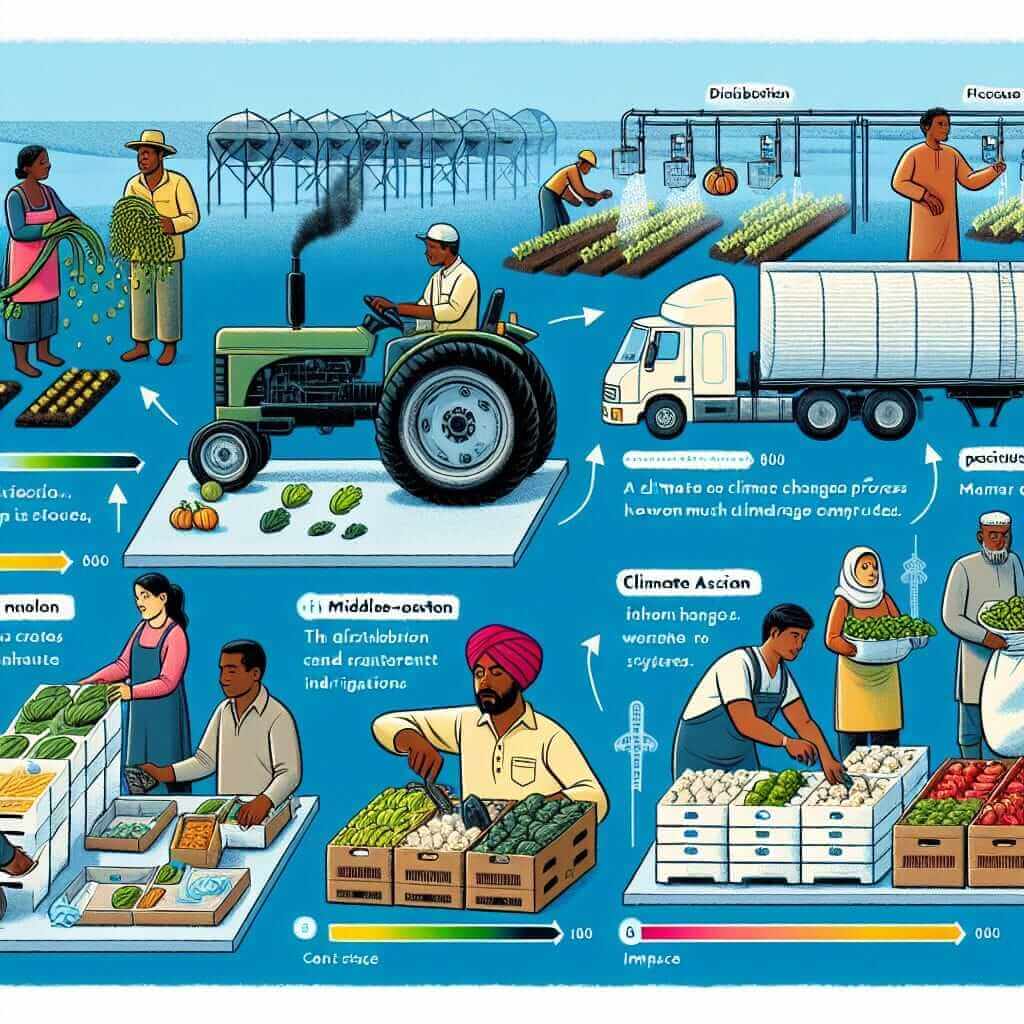The IELTS Reading test is a crucial part of the IELTS exam, assessing a candidate’s ability to read and comprehend written English. The topics in the Reading section often encompass contemporary issues that reflect global concerns, such as climate change and its impacts. Given the increasing importance of environmental topics, it’s probable that a subject like “How is climate change affecting global agricultural supply chains?” might appear in future tests. This article provides an in-depth Reading passage along with questions and answers to help you prepare effectively.
Reading Passage & Questions
Paragraph Reading: Medium Text
Title: How is Climate Change Affecting Global Agricultural Supply Chains?
Climate change presents significant challenges to global agricultural supply chains, which are crucial for ensuring food security worldwide. The increasing frequency of extreme weather events, such as droughts, floods, and heatwaves, disrupts crop production and affects yield stability. As a consequence, farmers are experiencing lower productivity and higher production costs.
Moreover, changing precipitation patterns and temperature anomalies alter the suitability of land for specific crops. For instance, staple crops like wheat, rice, and maize, which require specific climatic conditions, are particularly vulnerable. Regions that were once productive may no longer support these crops, forcing farmers to adapt by growing different types of crops or employing advanced agricultural techniques.
In addition to directly impacting crop production, climate change influences the stability and efficiency of the entire agricultural supply chain. Transportation routes and storage facilities are at risk due to extreme weather conditions. For example, roads and railways may be damaged by floods or landslides, hindering the timely delivery of produce to markets. Similarly, temperature fluctuations can compromise the integrity of storage facilities, leading to increased spoilage rates.
Global agricultural trade is also affected as countries face varying degrees of impact from climate change. Some countries may experience severe shortages of certain crops, prompting them to increase imports. Conversely, countries that manage to maintain stable production levels may find new opportunities for export. However, fluctuating trade policies and market prices add another layer of complexity to the agricultural supply chain.
Efforts to mitigate these impacts involve adopting sustainable agricultural practices and developing resilient supply chain systems. Techniques such as precision agriculture, drought-resistant crop varieties, and improved irrigation systems are essential. Additionally, enhancing cooperation among countries to share technology and resources can help create a more robust global agricultural system capable of withstanding the challenges posed by climate change.
Questions
Multiple Choice
-
What is one direct consequence of climate change on crop production?
- A. Increase in crop diversity
- B. Decrease in yield stability
- C. Lower production costs
- D. Improved agricultural techniques
-
Which staple crops are mentioned as vulnerable to climate change?
- A. Soybeans, barley, oats
- B. Wheat, rice, maize
- C. Beans, coffee, cotton
- D. Sugarcane, grapes, citrus
True/False/Not Given
-
Climate change only affects the agricultural production phase.
- True
- False
- Not Given
-
Some countries may increase exports due to stable production levels.
- True
- False
- Not Given
Matching Information
Match the impact with the corresponding consequence.
- A. Extreme weather events
- B. Changing precipitation patterns
- C. Damaged transportation routes
- D. Increased spoilage rates
i. Lower productivity
ii. Necessity to grow different crops
iii. Disrupt delivery to markets
iv. Compromised integrity of storage facilities
Answer Key
Multiple Choice
- B. Decrease in yield stability
- B. Wheat, rice, maize
True/False/Not Given
- False
- True
Matching Information
- A-i: Extreme weather events – Lower productivity
- B-ii: Changing precipitation patterns – Necessity to grow different crops
- C-iii: Damaged transportation routes – Disrupt delivery to markets
- D-iv: Increased spoilage rates – Compromised integrity of storage facilities
Common Mistakes and Tips for Improvement
Common Mistakes:
- Misinterpreting the question type, especially in True/False/Not Given sections.
- Overlooking specific details that lead to incorrect matching information.
- Misunderstanding complex sentence structures.
Tips for Improvement:
- Practice regularly: Consistent reading practice can help you become faster and more accurate.
- Pay attention to keywords: Identify and focus on keywords in the questions and passage.
- Understand question types: Familiarize yourself with the various types of IELTS Reading questions.
- Enhance your vocabulary: Broaden your vocabulary with targeted practice from IELTS reading lists.
Vocabulary
- Precipitation (noun) [pre-si-pi-ˈtā-shən]: Rain, snow, sleet, or hail that falls to or condenses on the ground.
- Anomaly (noun) [ə-ˈnä-mə-lē]: Something that deviates from what is standard, normal, or expected.
- Spoilage (noun) [ˈspȯi-lij]: The process of decaying or becoming less suitable for use over time.
Grammar
- Present Continuous for Progress:
- Structure: Subject + is/am/are + verb-ing
- Example: “Farmers are experiencing lower productivity.”
- Conditional Sentences Type 1:
- Structure: If + present simple, subject + will + base verb
- Example: “If regions no longer support these crops, farmers will adapt by growing different types.”
Advice for High Reading Scores
- Time Management: Allocate appropriate time to each section, ensuring you have enough time to answer all questions.
- Scanning and Skimming: Master the techniques of scanning and skimming to locate relevant information quickly.
- Note-taking: Jot down notes or underline key points while reading to better remember details.

By focusing on these strategies and practicing regularly, you’ll enhance your ability to tackle challenging reading passages effectively and achieve a higher score in the IELTS Reading test.